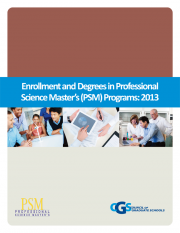You are on CGS' Legacy Site.
Thank you for visiting CGS! You are currently using CGS' legacy site, which is no longer supported. For up-to-date information, including publications purchasing and meeting information, please visit cgsnet.org.

Highly marketable degrees offer pathway to STEM careers
Contact:
Julia Kent
jkent@cgs.nche.edu
(202) 223-3791
Washington, D.C. – The Council of Graduate Schools (CGS) today released the results of its fourth annual Professional Science Master’s Enrollment and Degrees Survey documenting applications, enrollments, and degrees awarded in Professional Science Master’s (PSM) programs. The PSM is an innovative graduate degree designed to allow students to pursue advanced training in science or mathematics while simultaneously developing workplace skills highly valued by employers.
The 2013 report shows that PSM programs stand out as a bright spot for U.S. institutions in terms of domestic enrollment trends. From 2010 to 2013, first-time enrollment of domestic students rose 19% in PSM programs. For U.S. graduate education as a whole, first-time enrollment of domestic students rose only 1.9% in the five year period between 2007 and 2012, according to the latest CGS/GRE Graduate Enrollment and Degrees report. In contrast, first-time enrollment of international graduate students rose markedly from 2010 to 2013 in both PSM programs and in U.S. graduate programs overall.
Additional studies on the career outcomes of PSM graduates show high levels of student satisfaction and employment rates, which may be contributing to enrollment growth in PSM programs. According to a 2013 CGS survey, 91% of responding PSM graduates were employed in a job related to their field of study, and 68% of those employed full-time reported annual earnings above $50,000.
“Today’s STEM graduate students are seeking degrees that prepare them for success in a wide range of professional settings,” said CGS President Debra W. Stewart. “The real-world experiences and internships gained by PSM graduates make them highly marketable to employers in all sectors of the economy.”
The CGS study was supported in part by a grant from the Alfred P. Sloan Foundation. From 1997 to 2012, the Sloan Foundation made more than $23 million in grants in support of the PSM degree, including start-up funding for PSM programs at colleges and universities around the country; the founding of the National Professional Master’s Science Association, which provides professional support for PSM faculty and administrators; and a partnership with the Council of Graduate Schools to collect data on PSM programs and to administer a PSM affiliation process that ensures affiliated programs meet the highest standards.
“The Sloan Foundation is extremely proud to have played a founding role in the creation of the PSM degree,” said Elizabeth Boylan, Program Director of the Sloan Foundation’s programs in STEM Higher Education. “The continued growth of enrollments and the remarkable success graduates have had in the job market marks the PSM degree as one of the most successful innovations in 21st century higher education.”
This year represents a milestone in PSM development, as CGS will now transition the responsibilities for PSM program recognition to the Keck Graduate Institute (KGI).
“CGS’s expertise and guidance have been keys to a thriving PSM movement since its inception in 1997,” said Jim Sterling, KGI Vice President of Academic Affairs. “The Keck Graduate Institute looks forward to leading PSM programs into the future of professionally-focused science master’s education. Continuing to track the career outcomes of PSM graduates will be part of that commitment.”
The 2013 PSM Enrollment and Degrees report includes data on applications received and accepted for fall 2013, as well as enrollment data for fall 2013 and degrees awarded during the 2012-13 academic year. Data from 85% of all PSM programs worldwide are included. Additionally, the report offers comparisons to data from the previous surveys, documenting growth in applications, admissions, and enrollment over the past four years. Key findings include:
Applications:
- Over 7,000 applications were received for fall 2013 admission and 46% were accepted.
- Between fall 2010 and fall 2013, there was a 59% increase in applications received for admission into PSM programs.
First-Time Enrollment:
- Over 1,900 students were enrolled for the first time in PSM programs in fall 2013.
- Nearly two-thirds of all first-time PSM students were enrolled full-time while the remaining one-third were part-time students.
- 28% of first-time enrollees in U.S.-based PSM programs were temporary residents (i.e., international students).
Total Enrollment:
- Total enrollment in PSM programs has grown 23% since 2010, to exceed 5,800 students in fall 2013.
- Men comprised 53% of all PSM students and women made up 47%.
- Total PSM enrollment in fall 2013 was dominated by four fields of study: computer/information sciences (21%), environmental sciences and natural resources (15%), mathematics and statistics (15%), or biotechnology (14%).
Degrees awarded:
- Institutions responding to the survey awarded 2,038 PSM degrees in academic year 2012/13.
- 54% of PSM degrees awarded by respondents in academic year 2012/13 were awarded to men and 46% to women.
- 18% of graduates of U.S.-based PSM programs were international students.
- Among U.S. citizens and permanent residents, 23% of PSM graduates in 2012/13 were underrepresented minorities.
The report is available in pdf format at cgsnet.org and at sciencemasters.com.
The Council of Graduate Schools (CGS) is an organization of over 500 institutions of higher education in the United States and Canada engaged in graduate education, research, and the preparation of candidates for advanced degrees. Among U.S. institutions, CGS members award 92% of the doctoral degrees and 78% of the master’s degrees.* The organization’s mission is to improve and advance graduate education, which it accomplishes through advocacy in the federal policy arena, research, and the development and dissemination of best practices.
* Based on data from the 2012 CGS/GRE Survey of Graduate Enrollment and Degrees




